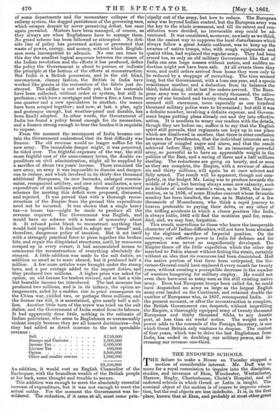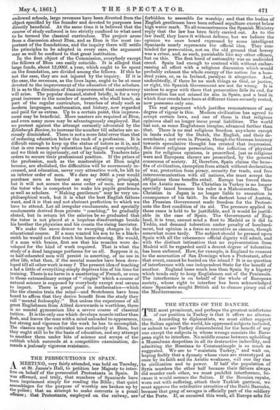THE ENDOWED SCHOOLS. T HE failure to make a House on
Tuesday stopped a motion of considerable interest. Mr. Duff was to move for a royal commission to inquire into the discipline, studies, and revenues of Eton, Winchester, Westminster, Harrow, Rugby, Charterhouse, Christ's Hospital, and all endowed schools in which Greek or Latin is taught. The nominal object of the motion is of course to improve educa- tion, but the real objects are less indefinite. It is, in the first place, known that at Eton, and probably at most other great endowed schools, large revenues have been diverted from the object specified by the founder and devoted to purposes less directly beneficial. At the same time it is believed that the course of study enforced is too strictly confined to what used to be termed the classical curriculum. The project arose from a discussion about Eton, and as Eton is the most im- portant of the foundations, and the inquiry there will settle the principles to be adopted in every case, the argument may as well be confined to that great institution.
large funds, about 12,0001. a year, which ought to be spent on the foundation, are divided among the fellows. If this be not the case, they are not injured by the inquiry. If it is the case, the revenues, as the lives lapse, ought to be at once devoted to the improvement of the education of the scholars. It is as to the direction of that improvement that controversy will arise. The popular demand, stated briefly, is for a very great increase in the number of masters, who shall teach, as part of the regular curriculum, branches of study such as modern languages, mathematics, and history, now regarded and paid for as extras. Up to a certain point, this improve- ment may be beneficial. More masters are required at Eton, and even many more may be advantageously employed. But we protest against the attempt earnestly advocated by the Edinburgh _Review, to increase the number till salaries are se- riously diminished. There is not a more fatal error than that of reducing education below the rank of a profession. It is difficult enough to keep up the status of tutors as it is, and that is one reason why education has slipped so completely, and we think so injuriously, out of lay hands. Teachers take orders to secure their professional position. If the prizes of the profession, such as the masterships at Eton might become, are abolished, the difficulties will be enormously in- creased, and education, never very attractive work, be left to an inferior order of men. We dare say 5001. a year would purchase men as learned as any existing principals, but it will not secure the same order of men, nor tempt the tutor who is competent to make his pupils gentlemen as well as scholars. "Making gentlemen" may be very un- philosophical work, but it is what the best English fathers want, and it is that and not abstract perfection to which we have to attend. Let all irregular emoluments, and specially emoluments derived from private "coaching," be gradually abated, but in return let the salaries be so graduated that the tutor is not placed at a hopeless disadvantage beside his brother the physician and his cousin the rising barrister. We make the same demur to sweeping changes in the educational course. If a man wanted his son to be a black- smith he would not first teach him horse-shoeing. He would, if a man with brains, first see that his muscles were de- veloped for the kind of work required. That is what the study of a dead language performs for us all. Suppose it is, as half-educated men will persist in asserting, of no use in after life, what then, if the mental muscles have been deve- loped till all other work is easy ? The present idea of teaching a lad a little of everything simply deprives him of his time for training. There is no harm in a smattering of French, or even in those extraordinary scraps of " ologies" which a course of natural science is supposed by everybody except real savans to impart. There is great good in mathematics—which like the classics train the mind—and Scotchmen have been heard to affirm that they derive benefit from the study they call "mental feelosophy." But unless the experience of all great Englishmen from Alfred downwards is worthless, there is no mental gymnasium like a severe course of classical tuition. It is the only one which develops muscle rather than flesh, and leaves the man with a mind unloaded to appearance, but strong and vigorous for the work he has to accomplish. The classics may be cultivated too exclusively at Eton, but they ought still to be the basis of education, and any attempt to smother them under bits of science and scraps of the rubbish which succeeds at a competitive examination, de- mands a jealously vigorous resistance.































 Previous page
Previous page